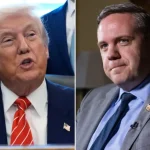
The Supreme Court agreed Friday to hear a significant 1st Amendment case that could reshape the balance between religious liberty and state taxation laws.
At the center of the case is a dispute involving the Catholic Charities Bureau in Wisconsin, which argues that it should be exempt from state unemployment taxes under the 1st Amendment. The petition, one of the high court’s first religious liberties cases of the term, stems from Wisconsin’s refusal to grant an exemption to Catholic Charities, despite similar exemptions being available in 47 states and federally for religious organizations.

University of Richmond law professor Kurt Lash posted to X that the focus for the justices will be determining “whether a church acts religiously when it provides charity to the needy.”
Wisconsin argues that Catholic Charities does not engage in traditional religious activities such as proselytizing and, therefore, does not qualify for the exemption. Wisconsin’s Supreme Court upheld this view earlier this year.
Represented by the Becket Fund for Religious Liberty, Catholic Charities contends that Wisconsin’s denial diverts resources from critical social services, calling the state’s rule “absurd and harmful.” The organization provides extensive support to the disabled and operates under the Diocese of Superior, a Roman Catholic institution.
Catholic Charities has received support from various religious groups, including Mormons, Muslims, Lutherans, and Jewish groups, according to several amicus briefs listed on the docket.
Patrick Elliott of the Freedom From Religion Foundation said that a decision favoring Catholic Charities could open the door to challenges against other taxes imposed on religiously affiliated entities, including hospitals and universities, and may result in the removal of employees from the state unemployment insurance system.
The 6-3 Republican-appointed Supreme Court’s move to take this case could signal a desire to refine or expand the scope of religious exemptions nationwide. Becket attorney Eric Rassbach posted on X that the case “goes to the heart of church-state relationships in this country.”
“Wisconsin is trying to make sure no good deed goes unpunished,” Rassbach told the Washington Examiner. “Penalizing Catholic Charities for serving Catholics and non-Catholics alike is ridiculous and wrong. We are confident the Supreme Court will reject the Wisconsin Supreme Court’s absurd ruling.”
Georgetown Law professor Steve Vladeck also noted that this is the court’s most significant religious liberty case in two years, following a string of rulings expanding protections for religious groups.
CLICK HERE TO READ MORE FROM THE WASHINGTON EXAMINER
A ruling favoring Catholic Charities could have widespread implications for how state and federal governments approach religious exemptions.
Although oral arguments have not been set for the case, a decision is expected by the end of June.







